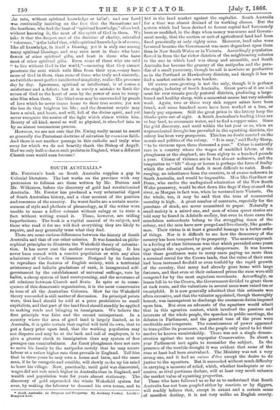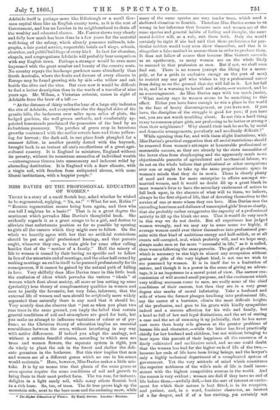SOUTH AUSTRALIA.*
MR. FORSTER'S book on South Australia supplies a gap in Colonial literature. The last works on the province with any pretension to fullness are those written by Mr. Dutton and Mr. Wilkinson, before the discovery of gold had revolutionized Australia. Mr. Forster has produced a very substantial digest of South Australian history, and a clear account of the position and resources of the country. Its worst faults are a certain unctu- ousness of style and plethora of phraseology, as if the writer were unable to name a fellow colonist without eulogy or to state a fact without writing round it. These, however, are trifling imperfections. The book is a capital manual of its subject, and those who read it for use will find everything they are likely to require, and may generally trust what they find.
There are some curious differences between the history of South Australia and that of our other colonies. It was founded on philo- sophical principles to illustrate the Wakefield theory of coloniza- tion. It has never cost the mother country a farthing. It has never been cursed with a convict population or with any alien admixture of Coolies or Chinamen. Designed by its founders to reproduce the features of English society, with a territorial aristocracy and infinite gradations of rank, it inaugurated self- government by the establishment of universal suffrage, vote by ballot, a cheap system of land conveyancing, and the severance of all relations between Church and State. In spite or in conse- quence of this democratic organization, it is the most conservative in tone of all the Australian Colonies. How far the Wakefield theory succeeded is still matter of discussion. Its principal points were, that land should be sold at a price prohibitive to small capitalists, and that part of the land fund should steadily be applied to making roads and bringing in immigrants. We believe the first principle was false and the second unimportant. In a country where the area of good land is largely limited, as in Australia, it is quite certain that capital will hold its own, that to put a fancy price upon land, that the working population may not disperse and may be at the beck and call of employers, is to give a greater check to immigration than any system of free passages can counterbalance. An Essex ploughman does not care to move his family to the antipodes merely that he may secure labour at a rather higher rate than prevails in England. Tell him that in three years he may own a house and farm, and the same man, if he be energetic and sensible, will slowly mike up his mind -to leave his village. Now, practically, until gold was discovered, wages did not rule much higher in Australia than in England, and wealth and population were for years almost stationary. The discovery of gold superseded the whole Wakefield system for ever, by making the labourer to demand his own terms, and to • Sontls Australia: its Progress and Prosperity. By Anthony Forster. London: Sampson Low.
bid in the land market against the capitalist. South Australia for a time was almost drained of its working classes. Bid the system which had been devised to favour capital had fortunately been so modified, in the days when money was scarce and Govern- ment needy, that the section or unit of agricultural land had been fixed practically at only eighty acres. Moreover, land sales were favoured because the Government was more dependent upon them thau in New South Wales or in Victoria. Accordingly population flowed in from the far richer districts of the neighbouring colonies
to the one in which land was cheap and accessible, and South Australia has become the granary of the antipodes and the para-
dise of a small yeomanry, though its soil is nowhere as productive as in the Portland or Hawkesbury districts, and though it has to find a market outside its own borders.
Of course corn-growing is not the only, though it is per the staple, industry of South Australia. Great parts of it are e-id must for ever remain purely pastoral districts, producing a large- boned and healthy sheep, with a somewhat coarse but very saleable wool. Again, two or three very rich copper mines have been found, and some hundred more have been worked at a loss, or barely pay expenses. Still the great prizes in the lottery keep the blanks quite out of sight. A South Australian's leading ideas are to buy laud, to economize water, and to find a copper mine. Since the gold discovery, and until within the last year or so, when an unprecedented drought has prevailed in the squatting districts, the colony has been very prosperous. This has no doubt reacted on the morals and politics of the colony. " It is easy," said Becky Sharp, " to be virtuous upon three thousand a year." Crime is naturally rare in a country where the wages of unskilled labour, of the ploughman or the shepherd, are from eighty to a hundred pounds a year. Crimes of violence are in fact almost unknown, and the temptation to " lift" sheep or horses is perhaps the form of frailty which the colonial mind feels it moat difficult to resist. Bush- ranging, an inheritance from the convicts, is of course unknown in South Australia, and would be impossible. Men like Gardiner or Dunn, who excite the undisguised admiration of the New South Wales peasantry, would be shot down like dogs if they crossed the river, as Morgan in fact was, when he ventured into Victoria. On the whole, too, it may be said that the tone of commercial morality is high. A great number of contracts, especially for the purchase of stock, are never committed to paper. Naturally a small society is a mixed one, and men of whom queer stories are told may be found in Adelaide society, but even in these cases the scandalous antecedents belong to the struggling times of the colony, and the men have now purged and live cleanly, like gentle- men. Their virtue is at least a graceful homage to a better order of things. Nor is it difficult to see how the democracy of the country has been tempered by its prosperity. The nearest approach to a feeling of class bitterness was that which prevailed some years ago against the squatters, or great sheepowners. It was known that these gentlemen were in many cases paying no more than a nominal rental for the Crown lands, that the value of their runs had been increased fivefold or even tenfold by the rapid growth of the country, that many had already gone home with large fortunes, and that even at their enhanced prices the runs were still competed for by the most sagacious merchants. Accordingly, as leases fell in to the Crown, the Government decided to grant them at rack rents, and the valuations in several cases were raised ten or twentyfold. It is now generally admitted that this estimate was often excessive, and that the valuator appointed, though thoroughly honest, was incompetent to discharge the enormous duties imposed upon him. But even an advocate of the squatters would admit
that in this agrarian contest, which involved the passions and interests of the whole people, the speeches in public meetings, the debates in Parliament, and the general tone of the press were creditable and temperate. The consciousness of power appeared to tranquillize its possessors, and the people only cared to let their resolve be known unmistakably. There was not a single demon- stration against the most unpopular Conservative. In about a year Parliament met again to reconsider the subject. In the presence of the terrible drought it was evident that some of the runs at least had been overvalued. The Ministry was not a very strong one, and it had no raison d'être except the desire to do justice to the squatters. But it succeeded without much difficulty in carrying a measure of relief, which, whether inadequate or ex- cessive, as rival partizans declare, will at least very much enhance the market value of squatting properties.
Those who have followed us so far as to understand that South Australia has not been peopled either by convicts or by diggers, will readily believe that, except in extent and a certain sense of manifest destiny, it is not very unlike an English county.
Adelaide itself is perhaps more like Edinburgh or a small Ger- man capital than like an English county town, as it is the seat of Government, and has no London in its neighbourhood to drain off the wealthy and educated classes. Mr. Forster shows very clearly and fully how much has been done iu a few years for the material well-being of the colony, which already possesses railroads, tele- graphs, a fair postal service, respectable hotels and shops, schools, churches, and public.buildings of every kind. In fact for churches, chapels, and congregations Adelaide will probably bear comparison with any English town. Perhaps a stranger would be even more impressed with the great number and beauty of the country seats. No country repays the landscape gardener more abundantly than South Australia, where the fruits and flowers of every climate in Europe may be found growing side by side —the willow and oak beside the olive and the vine. But even now it would be difficult to find a better description than in the words of a traveller of nine years ago. Mr. Wilson, a Victorian colonist, cornea in sight of Adelaide from the brow of a hill:— "At the distance of thirty miles the haze of a large city indicates the site of Adelaide, and everywhere else the dappled sides of the granite hills, the inclosures over miles upon miles of plain, the hedged gardens, the well grown orchards, and comfortably ap- pointed homesteads proclaimed the possession of the land by an industrious yeomanry. The patches of green crop in luxurious growths contrasted with the earlier cereals here and there yellow- ing for harvest ; the dark soil, in one place fresh ploughed for a summer fallow, in another prettily dotted with the haycock, brought back in an instant all one's recollections of a great agri- cultural country. It is England in miniature, England without its poverty, without its monstrous anomalies of individual wealth —extravagances thrown into unnecessary and indecent relief by abounding destitution. It is England with a finer climate, with a virgin soil, with freedom from antiquated abuses, with more liberal institutions, with a happier people."































 Previous page
Previous page